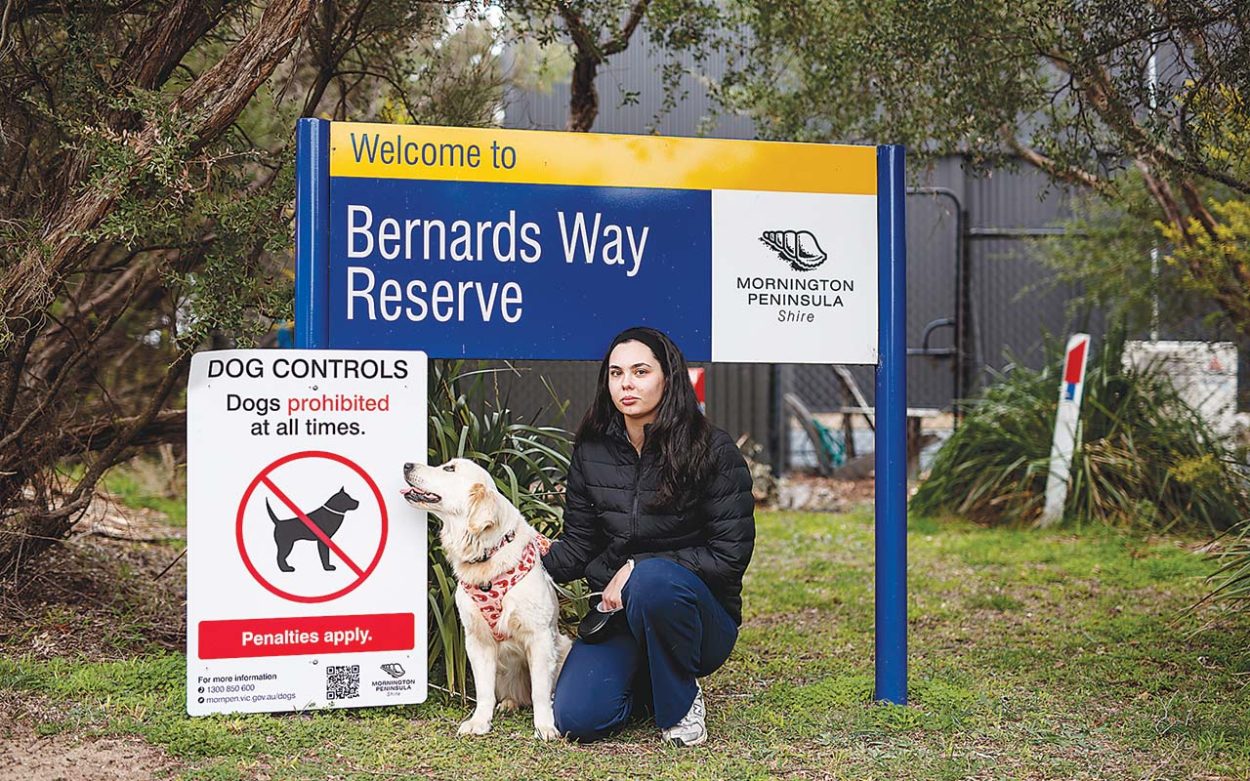MORNINGTON Peninsula Shire will review recent changes that have seen several previously on-leash dog areas abruptly reclassified as no-dog zones without public warning.
The changes, which affect various reserves and parks on the peninsula, have sparked frustration and confusion among dog owners and residents, many of whom were caught off-guard by the restrictions (“New dog ban areas spark concern”, The News, 16/07/25).
Impacted areas include Balnarring Beach Creek Reserve, Fawkner Ave Bushland Reserve in Blairgowrie, Bernards Way Reserve in Cape Schanck, Craigie Rd Bushland Reserve in Mt Martha, and Serpentine Reserve in Mornington.
According to a shire report, officers had undertaken “extensive community consultation on the dogs in public places over the last four years which culminated in council adopting the Dogs in Public Places Policy in 2023”.
It also noted that under state law, it had an obligation to “protect native species and manage biodiversity by establishing and managing reserves where vulnerable, threatened or endangered species are known to live”.
“Council undertook an audit of all the dog prohibited areas across the shire to identify any locations, which required additional signage and those where the prohibition could be removed, hence the new signage that has been erected and more visible,” the report said.
However, following concerns from the community, councillors Andrea Allen and David Gill led a successful motion at the council’s 22 July meeting calling for the council to issue a report by September reviewing the issue.
The report would also determine whether wildlife protection was needed, as well as detailing the known flora and fauna at each site, and “how the presence of dogs on lead is likely to have a significant impact on them”.
Cr Allen said a second round of community consultation late last year “did not include the 10 new prohibited sites or the other sites that we have heard concerns about”.
“We now have people quite perplexed about large dog prohibited signs appearing with no warning and more importantly, no consultation,” she said at the meeting.
She said community input was needed “given the reactions we’re getting to these new signs”.
Cr Gill said while “the matters that have caused some angst in the community”, he didn’t believe it was intentional as “oversights can happen”.
“Councillors and the public were not aware of particular changes until signs went up,” he said.
“There’s now some confusion and anxiety about restrictions that were not covered in consultation leaving dog owners, particularly, to complain about unexpected changes.”
But Gill noted a report by officers would offer the chance to “have a look at all those details,” adding “I know it’s more work for the officers and I think that on some occasions we need to do it”.
The motion, which was unanimously approved by councillors, will also ask the shire to determine whether the dog controls at Police Point Shire Park in Portsea, with community input, could be a mix of on-lead and leash-free rather than prohibited to protect black falcons and white-footed dunnarts.
Cr Allen said residents were confused about the latter species being protected as they needed forest and woodland cover, “so they are unlikely to venture into the grass area”.
Additionally, Cr Allen said it was important that officers did not enforce compliance of the new signed areas until a report came back.
The shire report said if community consultation was to occur, it would cost about $20,000.
Friends of Cape Schanck president Ian Renwick said residents had been taken by surprise after the new signage prohibiting dogs went up at Bernards Way Reserve, prompting a petition.
“In the 35 years of living locally, Bernards Way Reserve’s major use by the community has been as a walking path and link between the Cape Schanck residential area and the pathways/roadways in the RACV golf course precinct,” he said.
Renwick expressed appreciation that Cr Gill took their concerns seriously and was hopeful of a sensible and swift resolution.
Friends of Bernards Way Reserve member Phil Mottolini said there was “clearly no adverse impacts from permitting dog access”.
“It is indeed this group that has diligently been working to restore what was previously a neglected (by the shire) parcel of land, infested with invasive plants and weeds, and constituting a significant fire hazard for the area. To the extent that the reserve now has any enhanced environmental value is largely due to the work of this group,” he said.
First published in the Mornington News – 29 July 2025



